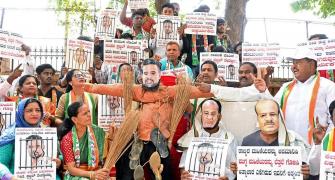Akhtar, a resident of Prabodhi village in Bihar's Vaishali district, said "talaq, talaq, talaq" to his wife Sakeena in a fit of rage after she objected to his drinking. Akhtar's neighbours informed the local maulvi, Inamul Haq Khan, about the incident, who quoting from the Shariat law decreed that the couple have been divorced and would have to live separately.
"Triple talaq, uttered even in an inebriated state, holds that they are barred under Islamic law from living together as man and wife," Khan said.
Akhtar, a father of three, admits his guilt but says his drunken state at the time of the incident should be kept in mind and he should be forgiven. "I was drunk. I don't remember whether I pronounced talaq once or three times.
I want to be with my wife and children," said Akhtar, who is living at his shop ever since the decree by the cleric four days ago.
Sakeena says he was too drunk to realise the seriousness of uttering talaq and wants him forgiven. Under the Islamic law if a divorced woman wants to remarry her first husband, she has to perform halala marry another person and then divorce him to facilitate remarriage with the first husband.
When contacted for comments Bihar Housing Minister Monaz Hassan said the couple would have to follow the Shariat law as interpreted by the village cleric.
"The maulvi has taken the right decision. If the couple still continue to live together, it would be haram (sin) under the Islamic law," he said.







